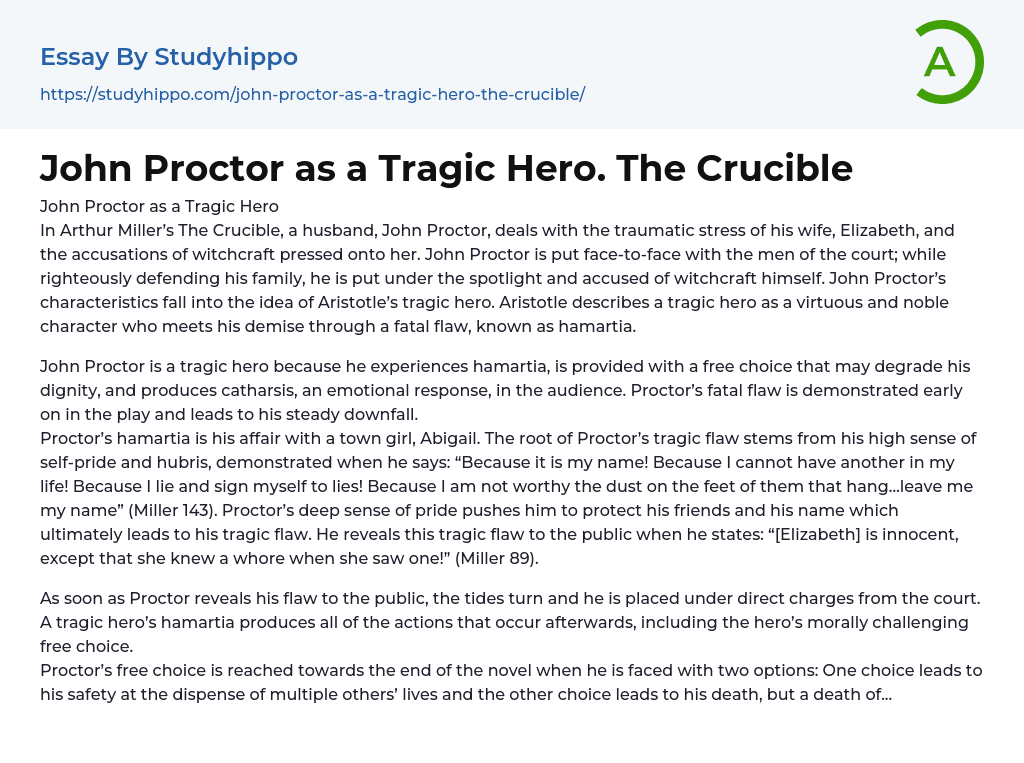

John Proctor as a Tragic Hero. The Crucible Essay Example
John Proctor as a Tragic Hero
In Arthur Miller’s The Crucible, a husband, John Proctor, deals with the traumatic stress of his wife, Elizabeth, and the accusations of witchcraft pressed onto her. John Proctor is put face-to-face with the men of the court; while righteously defending his family, he is put under the spotlight and accused of witchcraft himself. John Proctor’s characteristics fall into the idea of Aristotle’s tragic hero. Aristotle describes a tragic hero as a virtuous and noble character who meets his demise through a fatal flaw, known as hamartia.
John Proctor is a tragic hero because he experiences hamartia, is provided with a free choice that may degrade his dignity, and produces catharsis, an emotional response, in the audience. Proctor’s fatal flaw is demonstrated
... early on in the play and leads to his steady downfall.
Proctor’s hamartia is his affair with a town girl, Abigail. The root of Proctor’s tragic flaw stems from his high sense of self-pride and hubris, demonstrated when he says: “Because it is my name! Because I cannot have another in my life! Because I lie and sign myself to lies! Because I am not worthy the dust on the feet of them that hang…leave me my name” (Miller 143). Proctor’s deep sense of pride pushes him to protect his friends and his name which ultimately leads to his tragic flaw. He reveals this tragic flaw to the public when he states: “[Elizabeth] is innocent, except that she knew a whore when she saw one!” (Miller 89).
As soon as Proctor reveals his flaw to the public, the tides turn and he is placed under direc
charges from the court. A tragic hero’s hamartia produces all of the actions that occur afterwards, including the hero’s morally challenging free choice.
Proctor’s free choice is reached towards the end of the novel when he is faced with two options: One choice leads to his safety at the dispense of multiple others’ lives and the other choice leads to his death, but a death of...
- Allegory essays
- Alliteration essays
- Comedy essays
- Comic book essays
- Drama essays
- Dystopia essays
- Fairy Tale essays
- Fantasy essays
- Fiction essays
- Ghost essays
- Gothic Fiction essays
- Gothic Literature essays
- Irony essays
- Legend essays
- Memoir essays
- Novel essays
- Poetry essays
- Satire essays
- Science Fiction essays
- Short Story essays
- The western essays
- Tragedy essays
- Witchcraft essays
- Ben jonson essays
- Billy elliot essays
- Dred Scott essays
- Frederick Douglass essays
- Geert Hofstede essays
- George Eliot essays
- Ginevra King essays
- Harriet Tubman essays
- John Keats essays
- John Proctor essays
- Joseph Stalin essays
- Mahatma Gandhi essays
- Napoleon essays
- Robert E Lee essays
- Rosa Parks essays
- Siegfried Sassoon essays
- Wilkie collins essays
- American Literature essays
- Between The World and Me essays
- Book Report essays
- Book Review essays
- Book Summary essays
- Books essays
- Character essays
- Coming of Age essays
- Dante's Inferno essays
- Everyday Use essays



